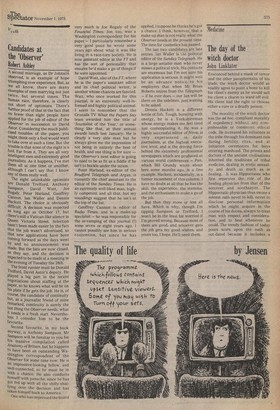Candidates at the 'Observer'
Robert Ashley
'A second mirriage, as Dr Johnsal Observed, is an example of hope tnumphing over experience. But, as we all know, there are many examples of men marrying not just twice, but several times. The human race, therefore, is clearly not short of optimists. There's further proof of that in the fact that no fewer than eight people have applied for the job of editor of the Observer in succession to David Astor. Considering the much publicised troubles of the paper, you might think only a fool would want to take over at such a time. But the trouble is that none of the eight is a fool. Far from it. They are all very intelligent men and extremely good journalists. As it happens, I've met them all at one time or another, although I can't say that I know allY of them really well. The eight unsinkable optimists are Donald Trelford, Anthony Sampson, David Watt, Joe Rogaly, Peter Harland, Geoffrey Cannon, Ian Waller and Dennis Hackett. The choice is obviously difficult. A decision was expected as long ago as October 17, but ,there's still a Vatican-like silence in Queen Victoria Street. Selection hasn't been made easier by the fact that the job wasn't advertised, so that new applications have been coming forward as the days went by and no announcement was made. But the lists are now closed, as they say, and the decision is expected to be made at a meeting in the evening of Tuesday the 28th.
The front runner must be Donald Trelford, David Astor's deputy. He Played a big part in the recent negotiations about staffing at the Paper, so he knows what will be on his plate if he gets the job. He is, of course, the candidate of continuity but, as a journalist friend of mine remarked, continuity is surely the last thing the Observer needs: what It needs is a fresh start. Nevertheless I consider him to be the favourite.
Second favourite, in my book anyway, is Anthony Sampson. Mr Sampson will be familiar to you for his massive compilation called Anatomy of Britain, but he happens to have been an outstanding Washington correspondent of the Observer for some time now. He is an impressive-looking fellow, and well-connected, so he must be in With a chance. He also conducts himself with panache, since he has Rot fed up with all the shilly-shallying over the decision and has taken himself back to America.
One who has impressed the board
very much is Joe Rogaly of the Financial Times. Joe, too, was a Washington correspondent for his paper — I particularly remember a very good piece he wrote some years ago about what it was like living in a race-torn society. He is now assistant editor at the FT and has the sort of personality that ensures he'd make a go of things if he were appointed.
David Watt, also of the FT, where' he is the paper's assistant editor and its chief political writer, is another whose chances are fancied. Watt, who once worked for this journal, is an extremely well-informed and highly political animal. I seem to remember that the Granada TV What the Papers Say team awarded him the title of 'Journalist of the Year,' or something like that, at their annual awards lunch last January. He is clearly a very able man but he always gives me the impression of not being in entirely the best of health, and one thing is for sure — the Observer's next editor is going to need to be as fit as a fiddle if he isn't to buckle under the strain.
Peter Harland, ex-editor of the Bradford Telegraph and Argus, is currently the chief assistant to the editor of the Sunday Times. He is an extremely well-liked man, highly competent and all that, but my soundings suggest that he isn't at the top of the list.
Geoffrey Cannon is editor of Radio Times, and is a make-up specialist — he was responsible for the re-vamping of this journal (!) some seven or eight years ago. I cannot possibly see him in serious contention, but since he has applied, I suppose he thinks he's got a chance. I think, however, that a make-up man is not really what the Observer needs at the present time. The time for cosmetics has passed.
The last two candidates are late entries. Ian Waller is the political editor of the Sunday Telegraph. He is a large amiable man who never misses a political trick. His contacts are enormous but I'm not sure his application is serious. It might well be an advance notice to his employers that when Mr Brian Roberts retires from the Telegraph — if he ever does — our Ian will be there on the sidelines, just waiting to be asked.
Dennis Hackett is a different kettle of fish. Tough, bursting with energy, he is a Yorkshireman whose energy makes me feel tired just contemplating it. He was a highly successful editor of Nova, is very experienced in daily journalism, at the highest executive level, and is the driving force behind the extremely professional newspapers which are produced at various world conferences — Pan, which Bill Grundy wrote about here some months ago, is a fine example. Hackett, incidentally, is a former incumbent of this column. I have no doubt at all that he has the skill, the experience, the stamina, and the enthusiasm to make a go of the job.
But then they more or less all have. Which is why, though I'm tipping Sampson or Trelford, I won't be in the least bit worried if I'm proved wrong. Because most of them are good, and whoever gets the job gets my good wishes, and yours too, I hope. He'll need them.
































 Previous page
Previous page